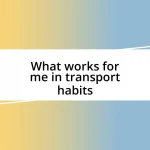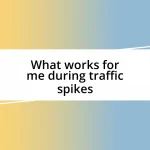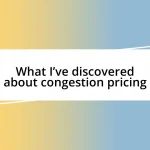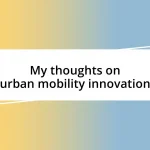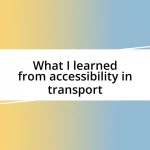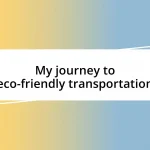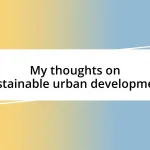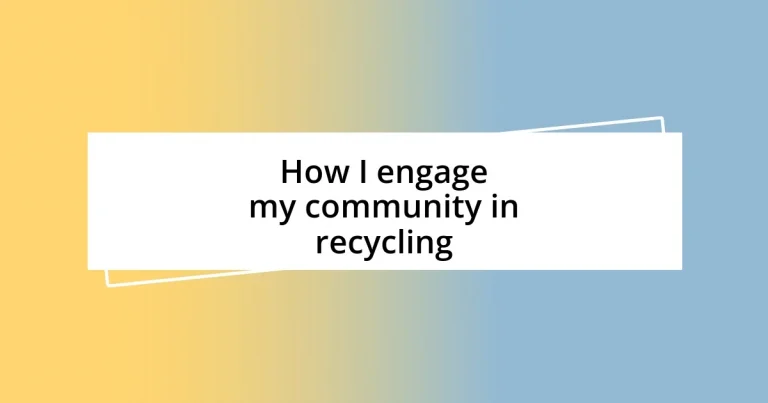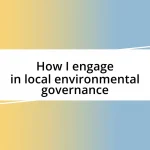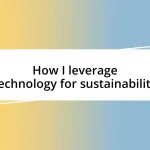Key takeaways:
- Understanding community recycling needs requires listening and addressing specific knowledge gaps through engagement and education.
- Creating engaging recycling education programs through interactive workshops, storytelling, and monthly challenges fosters deeper community involvement and accountability.
- Building partnerships with local businesses and promoting success stories enhances recycling initiatives and cultivates a sense of community investment in sustainability.
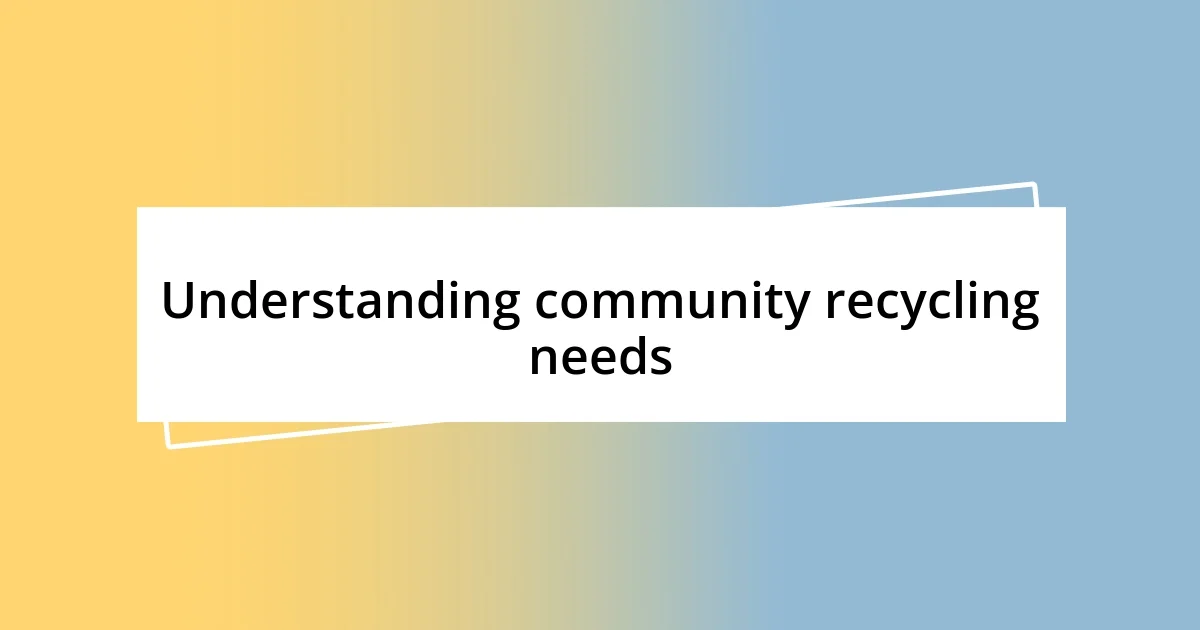
Understanding community recycling needs
Understanding community recycling needs starts with listening. I remember attending a town hall meeting where residents expressed frustration over the lack of clear recycling guidelines. How often do we assume everyone knows what can be recycled when, in reality, confusion abounds? It’s crucial to gauge the community’s awareness and perceptions about recycling procedures.
Through my own experience, I often find that what’s widely known about recycling can vary dramatically. Some neighbors are well-versed in sorting materials, while others wonder if a greasy pizza box belongs in the bin. Engaging in conversations and surveys can reveal these gaps in understanding, allowing us to tailor educational initiatives that resonate with the community. When we address these specific needs, it fosters a sense of ownership and responsibility toward recycling efforts.
Additionally, emphasizing the environmental impact can ignite passion within the community. During a local litter cleanup event, I noticed how individuals modified their recycling habits once they grasped the connection between their actions and the health of our planet. It’s not just about bins and labels; it’s about creating a culture where recycling feels like a shared commitment.
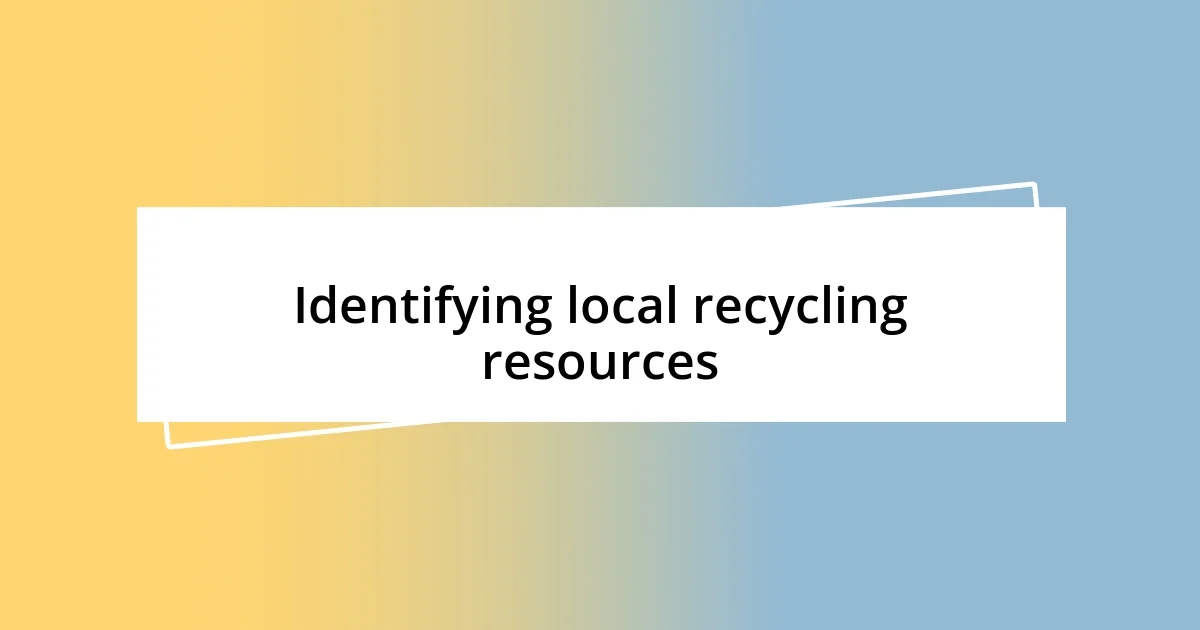
Identifying local recycling resources
To effectively identify local recycling resources, I recommend starting with a good old-fashioned exploration of your community. I recall a Saturday spent visiting various local establishments like libraries, schools, and community centers, where I discovered flyers and pamphlets detailing recycling programs. This kind of hands-on research can unveil hidden resources that many might overlook.
Here’s a quick list of local recycling resources you can tap into:
- City or County Recycling Programs: Often found on city government websites, these resources outline what can be recycled in your area.
- Local Nonprofits: Many non-profit organizations focus on sustainability and may host recycling workshops or drop-off events.
- Community Boards: Check out bulletin boards at parks or coffee shops where local recycling enthusiasts may post useful information.
- Social Media Groups: Joining neighborhood groups can provide real-time updates on recycling options and community initiatives.
- Local Businesses: Some businesses host recycling drives or have specific programs for recycling materials such as electronics or batteries.
By engaging directly with local resources, you’re not just gaining insights but also building connections with community members invested in recycling. Just the other week, I met a local artist who creatively repurposes recycled materials into unique art pieces. That interaction didn’t just broaden my understanding—it inspired me to get involved in local initiatives. It’s amazing what you can discover when you’re willing to explore and interact!
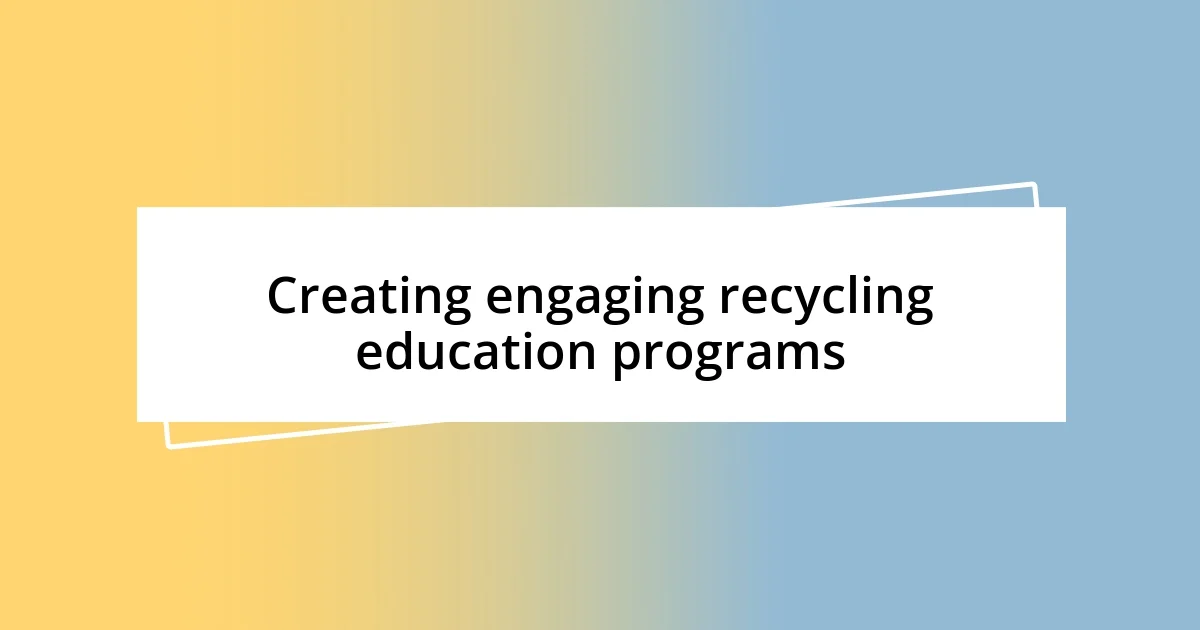
Creating engaging recycling education programs
Creating engaging recycling education programs requires creativity and connection. I’ve found that interactive workshops can make a tremendous impact. For example, one summer, I facilitated a hands-on recycling workshop for children at the local library. We turned it into a game, with prizes for the best-sorted materials. Seeing their excitement as they learned about recycling made me realize how engaging activities can transform perceptions and behaviors toward waste management.
To foster deeper community engagement, I think we should also tap into local stories. A neighborhood clean-up event I organized last fall included a storytelling session where residents shared their favorite recycling tips. This unexpected twist not only made the event enjoyable but unveiled practical insights from individuals who had successful recycling experiences. Those personal stories helped build a communal spirit that I had never anticipated, reinforcing the idea that recycling isn’t just a chore; it’s an opportunity for collaboration.
Consistency is key in educational programs. I’ve noticed that people often forget what they learn without regular reminders. This year, I implemented monthly recycling challenges through social media, encouraging folks to post their recycling efforts and share tips. The spontaneity of this program reenergized our community’s enthusiasm. I found that when people feel part of something larger than themselves, like a collective challenge, they’re more likely to stay engaged and committed.
| Engaging Strategy | Description |
|---|---|
| Interactive Workshops | Hands-on learning experiences that make recycling fun, particularly for kids. |
| Community Storytelling | Sharing personal recycling stories to foster connection and relay practical tips. |
| Monthly Challenges | Social media challenges that encourage community participation and accountability. |
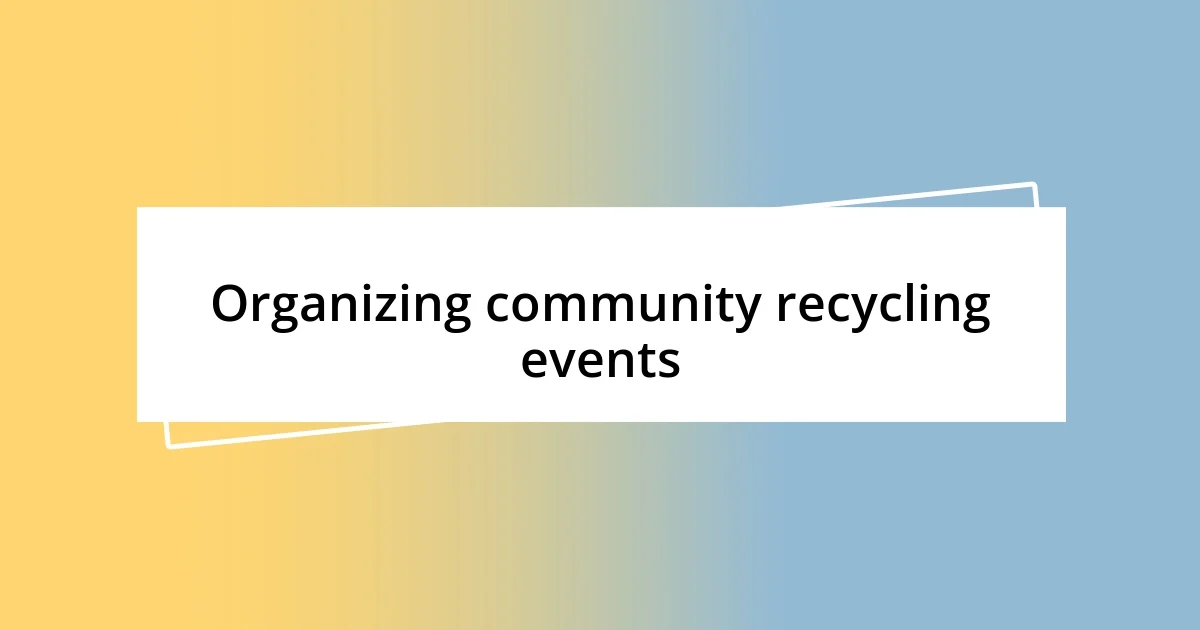
Organizing community recycling events
Organizing community recycling events can be a rewarding experience for everyone involved. One time, I teamed up with a local school to host a neighborhood recycling day. It amazed me to see families come together, bringing everything from cans to old electronics. The feeling of collective purpose reminded me that we all share responsibility for caring for our environment, making it so much more than just a chore.
Another aspect I find essential is promoting the event effectively. I once created colorful flyers and a social media campaign that showcased the event’s fun activities, like recycling games and even a “most creative item made from recyclables” contest. Don’t you think such a playful approach would attract more participants? I saw firsthand how excitement brought people out, transforming what could’ve been a mundane event into a vibrant gathering.
Finally, feedback from the community is invaluable. After one of our events, I gathered participants to share their thoughts and ideas. It was incredible to hear everyone’s enthusiasm and suggestions for future recycling initiatives. Engaging the community in this way not only builds a sense of ownership but also fosters ongoing dialogue about the importance of recycling. Wouldn’t you agree that this feedback loop can help us evolve our initiatives and make an even bigger impact?
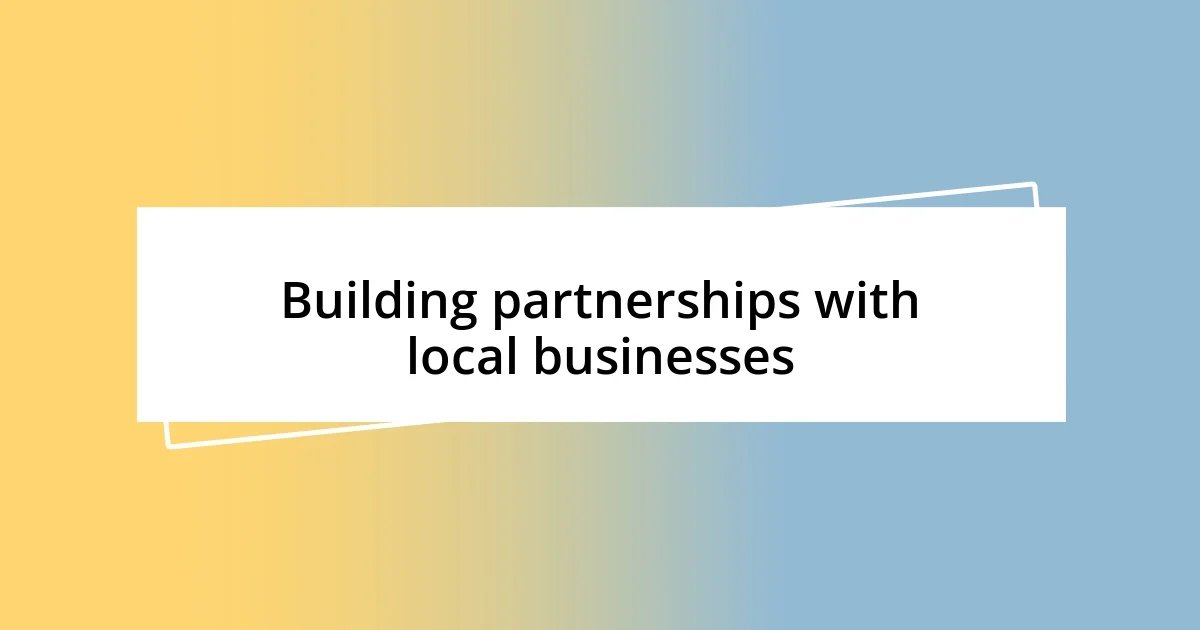
Building partnerships with local businesses
When I first started collaborating with local businesses on recycling initiatives, I was surprised by how willing they were to participate. One bakery offered to provide discounts to customers who brought in used packaging for recycling. This not only engaged their clientele but also promoted sustainable practices while boosting their business. It’s a win-win, don’t you think? Forming these partnerships fosters a sense of community where businesses feel like true stakeholders in environmental efforts.
I’ve also discovered that local businesses often have unique resources or spaces they can contribute. For instance, a nearby coffee shop invited us to host a monthly recycling awareness session in their cozy space. I couldn’t believe how many regulars attended, eager to learn more and share their own recycling challenges. It created a natural atmosphere of exchange, where ideas flowed freely, and the bond between customers and the shop deepened. This experience really drove home how leveraging existing community relationships can enhance our recycling outreach.
Another memorable collaboration stemmed from partnering with a local hardware store to organize a “Repair Cafe” event. I remember feeling a surge of excitement as I watched people share their tips on fixing broken items instead of tossing them out. Combining recycling with repair practices not only lessened waste but also built connections among attendees. It’s moments like these that highlight how essential local businesses can be in shifting mindsets towards sustainability, wouldn’t you agree?
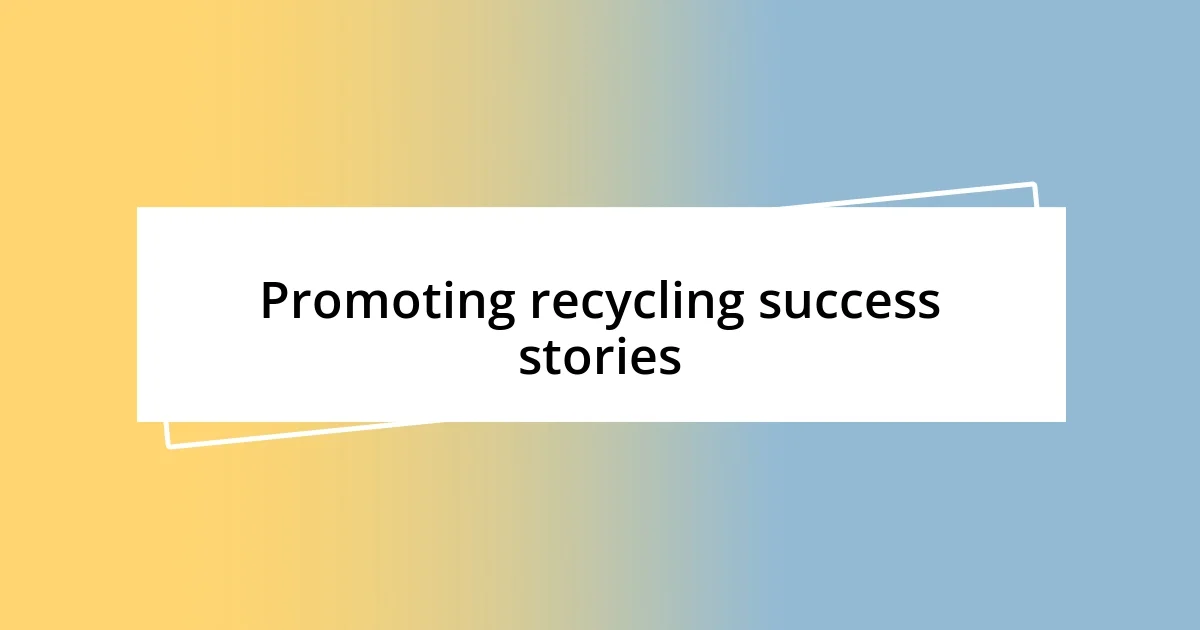
Promoting recycling success stories
Promoting recycling success stories has proven to be instrumental in encouraging others to join the movement. I vividly recall when a neighbor approached me, excited to share how our last event inspired her family to set up a recycling corner at home. Her simple act had a ripple effect—soon, her friends were sharing similar projects on social media, showcasing their creative recyclables. Isn’t it amazing how one story can ignite a spark in others?
In another instance, I decided to spotlight local schools that embraced recycling as part of their curriculum. I created a mini-documentary that featured students passionately discussing their recycling initiatives. Watching their faces light up as they shared their accomplishments made me realize the power of storytelling. This not only motivated other schools to engage but also fostered pride in their achievements. Who doesn’t feel inspired when seeing the enthusiasm of kids taking action?
I also discovered the value of sharing these success stories through community newsletters and local events. I remember attending a neighborhood gathering where residents exchanged their personal recycling triumphs, like turning old glass jars into stylish home décor. The warmth of that evening reminded me that these narratives do more than inform; they connect us on a deeper level. Shouldn’t we all seek to transform our recycling efforts into shared moments of joy and accomplishment?
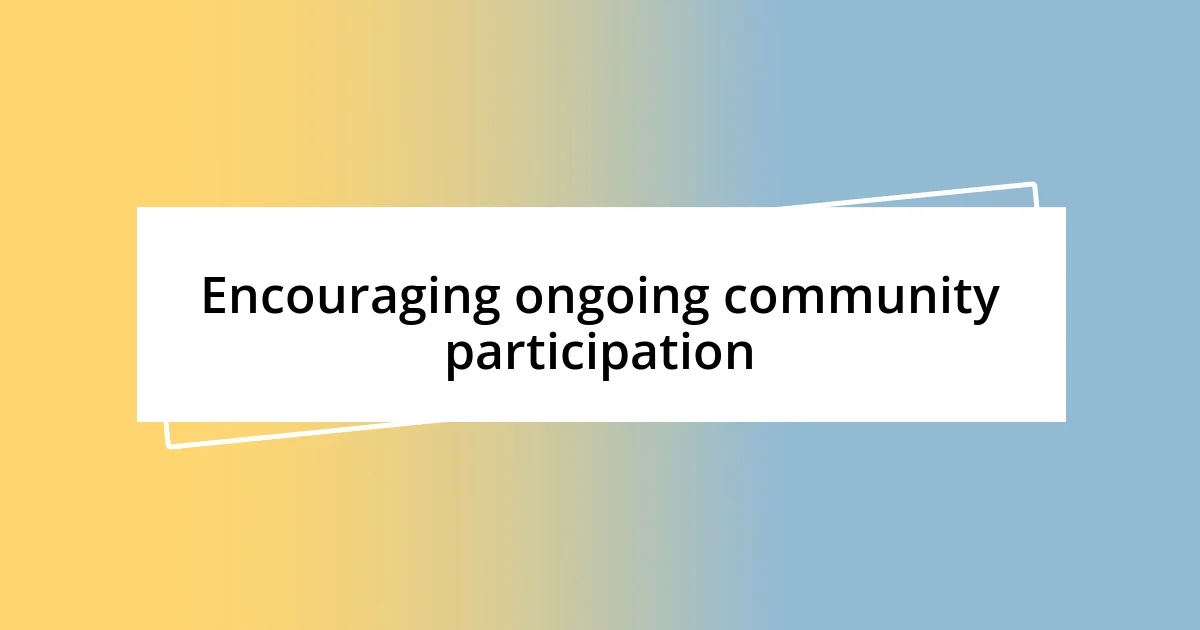
Encouraging ongoing community participation
One of the most effective ways to encourage ongoing community participation is by creating a platform for everyone to share their thoughts and experiences. For example, I initiated a monthly “Recycling Roundtable” where community members gather to discuss their challenges and victories with recycling. I can still remember the enthusiastic conversations that emerged, with participants exchanging practical tips and solutions. Have you ever seen how powerful it is when people feel heard? It transforms the environment and keeps folks coming back month after month.
I also found that friendly competitions can foster ongoing engagement, so I organized a “Recycling Challenge” where families tracked their recycling efforts over a month. The thrill during our celebration event was palpable. I’ll never forget the delighted expressions on the children’s faces as they received recognition for their efforts. It strengthened relationships, built camaraderie, and left participants eager for the next round. Doesn’t it feel good to be part of a community that celebrates each other’s progress?
Lastly, I’ve started distributing recycling pledge cards to families, urging them to commit to reducing waste and engaging in recycling practices. When I see families proudly display their signed pledges at events, it reinforces not just individual commitment but collective action. It’s a reminder that every small step counts. What could be more rewarding than nurturing a culture where everyone feels responsible and engaged?
